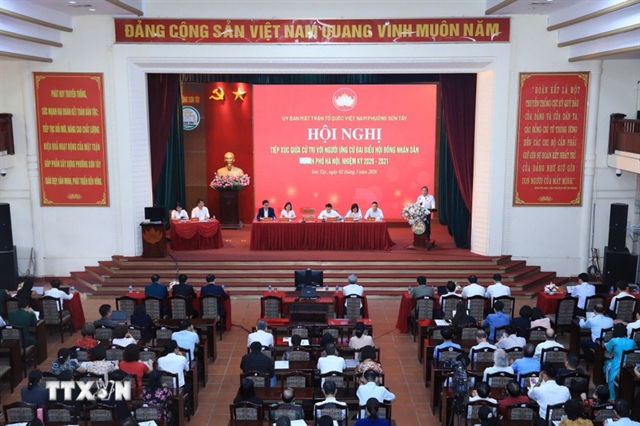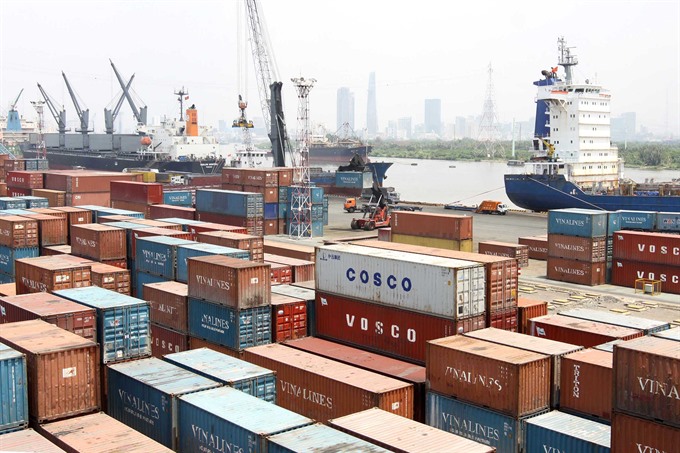 Politics & Law
Politics & Law

Top lawmakers meeting Saturday urged stricter financial discipline and better public debt management consistent with international standards.
 |
| Containers at Sài Gòn Port in HCM City. National Assembly deputies accept the Government’s scenario of a 7.01 per cent GDP growth over next five years. — VNA/VNS Photo Thanh Vũ |
HÀ NỘI — Top lawmakers meeting Saturday urged stricter financial discipline and better public debt management consistent with international standards.
The 14th National Assembly’s second meeting focused on investment plans for 2016-2020, the mobilisation and use of loans and public debt management.
Participants also approved the Government’s report on the implementation of the financial and budget tasks over the past five years.
They acknowledged that the State budget revenue as a part of the gross domestic product (GDP) witnessed a faster decline than during the previous period.
According to a Government report, the revenue mobilised from taxes and fees accounted for 20 to 21 per cent of GDP, partly due to the tax exemption policy, which aims to remove obstacles for doing business.
Deputy Mai Thị Ánh Tuyết from the Cửu Long (Mekong) Delta province of An Giang said that the Government should seriously evaluate the tax exemption and reduction policies. “The policies should be viewed in the perspective of which one has impetus to the economy and which one does not generate revenue for the budget,” she said.
The deputies also expressed dissatisfaction with the Government presenting the NA with a fait accompli in the budget settlement. They said that almost all expenditures exceeded and were inconsistent with development goals, which showed a lack of fiscal discipline.
Tuyết from An Giang Province asked for stricter handling of such cases, especially the disbursement of each project, to create clarity and discipline.
According to Tuyết, the NA’s supervision of the investment in construction works exposes waste and spreading problems. Some official development assistance (ODA) projects greatly exceeded estimates, she said. She said such issues needed to be dealt with severely.
Discussing two scenarios of economic growth in the next five years - of 7.01 per cent annual GDP growth and 6.08 per cent GDP growth - the deputies agreed that the Government’s higher scenario was a more appropriate target. However, they urged synchronised resources and solutions to achieve the selected scenario in line with economic restructuring in the next five years.
Nurturing revenue sources
A delegate from HCM City raised concern over the reduction of the municipal regulatory budget from 23 per cent of the entire budget set aside for localities to 18 per cent for the period 2017-2020, saying that it was too steep.
"I agree with the reduction but it should be at a level which can ensure that the city has the resources to invest,” said deputy Nguyễn Thị Quyết Tâm, adding that the rate could be reduced from 23 to 21 per cent.
Tâm explained that an abrupt reduction of the regulatory ratio of local budget would be too harsh for the city economy and would have a negative impact on sustainable growth.
Sharing the same point of view, deputy Phan Thanh Bình asked for reasonable policies to raise revenues.
Safer public debt
The deputies also said that the target of State budget deficit under 4 per cent of the GDP by 2020 was appropriate.
The annual target of public debt not to exceed 65 per cent of GDP was also appropriate, they said.
Tuyết from An Giang Province explained that the current public debt at 62.2 per cent was already high and a better level of public debt needed to be ensured in the future.
“With the situation of Việt Nam, the best public debt over GDP is 60 per cent,” she said, explaining that as Việt Nam is a developing country, raising public debt to 65 per cent of GDP is unreasonable and make the economy unsustainable.
She also warned that the Government debt of 50.3 per cent of GDP was at alarming level and must not be further raised to 55 per cent for the next five years.
The deputies agreed with the Government’s financial solutions for the next five years: are restructuring financial markets, and ensuring reasonable structure of the money market, the capital market and the insurance market.
They recommended rapid development of the capital and insurance markets, saying developing the securities market would be good for Việt Nam in mobilising social capital and foreign capital.
Deputy Prime Minister Vương Đình Huệ said that raising the debt ceiling, as some suggested, would affect the country’s loan repayment capacity. “The Government has discussed, considered and decided to keep the debt ceiling,” he said.
“To ensure a safe and stable debt ceiling, we are determined to keep the annual public debt below 65 per cent of the GDP, the Government debt at 55 per cent and the foreign debt not to exceed 50 per cent,” he said. — VNS




